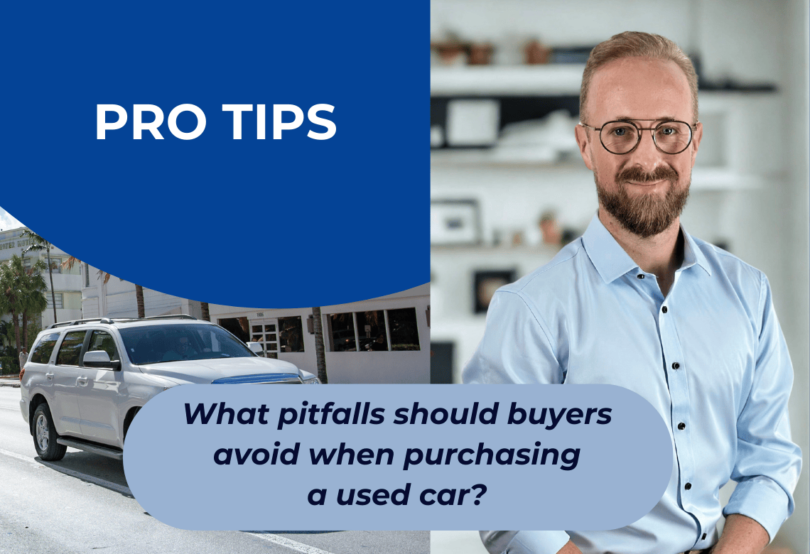Pro Tips: The Keys to Smart Buying in Florida
Buying a used car in Florida may seem simple, but the market is vast, complex, and sometimes risky. Between giants like CarMax or Carvana, traditional dealerships, independents, and even auctions, options abound. How do you find your way, avoid pitfalls, and make a safe purchase? The French District spoke with Mathieu Blondeau, a Florida-based entrepreneur and industry specialist, to shed light on the keys to this booming market.
Interview with Mathieu Blondeau, a French entrepreneur and investor, founder of more than a dozen companies in the automotive, real estate, and technology sectors. Mathieu Blondeau is an expert in the field, both in France and now in Florida.
French District: Hello Mathieu, thank you for helping us understand how to navigate the used car market in Florida.
Who are the biggest players in the Florida used car market?
In Florida, the used car market is already highly competitive and dynamic. Among the main players, there’s of course CarMax, recognized nationwide for its large inventory and fixed no-haggle prices. CarMax also stands out for its instant car-buying service: the customer receives their money immediately and the transaction is extremely simple, even if the price offered is usually more advantageous for the company than for the seller.
Alongside it, Carvana has positioned itself as an innovative player that has elevated the user experience to a rarely seen level. The company has simplified the buying and selling process, particularly for individuals looking to sell their car, avoiding the often long and exhausting negotiations at traditional dealerships. Everything happens online: you can buy or sell from your computer or phone, with clear guarantees. The car is then delivered directly to your home, and the buyer can even test it after delivery. This 100% digital model, which combines simplicity and transparency, appeals to more and more consumers, even though it remains limited by the lack of physical contact with the vehicle before purchase.
At the same time, a significant part of the market is still driven by brand dealerships such as Ford, Toyota, or Chevrolet, not to mention the strong presence of independent dealers, who represent a major share of local transactions.
What are their advantages and disadvantages?
-
CarMax
CarMax offers a reassuring buying experience, with displayed, non-negotiable prices and clear warranties. This avoids unpleasant surprises, but also means there’s no room for negotiation and that trade-in values are often more favorable to the company than to the customer. -
Carvana
Carvana stands out for the simplicity and speed of its 100% online model. You can buy or sell from your computer, have the car delivered to your home, and—its biggest strength—try it out at home before deciding to keep it. This model has won over many Americans because it avoids the experience nearly everyone dreads: spending four hours at a dealership negotiating, with surprise fees or add-ons at the finance desk. On the flip side, the lack of direct contact and test-driving before delivery can deter more traditional buyers. -
Brand dealerships
Brand dealerships (Toyota, Ford, Chevrolet, etc.) reassure customers with certified vehicle programs and official after-sales service, but their prices are often higher. -
Independent dealerships
Independent dealers usually offer more flexibility on prices and conditions, but vehicle quality and professionalism can vary greatly from one dealer to another.
Who are the smaller players in the market?
Beyond the major groups, Florida is home to a multitude of small local players. These are generally independent, often family-run dealerships with just a few dozen vehicles. They attract customers through proximity, price flexibility, and tailored solutions such as financing or trade-ins. To boost visibility, many now use online platforms like CarGurus, AutoTrader, or Facebook Marketplace, which play a key role in connecting with buyers.
Advantages and disadvantages?
Their advantage is flexibility and direct customer contact, often with more attractive prices. Their drawback is a limited selection and sometimes fewer guarantees or safeguards, especially for peer-to-peer sales on CarGurus, AutoTrader, or Facebook Marketplace.
Are car auctions risky?
In France, we buy at auctions professionally because we’re major market players and it’s part of our business. But it’s not for everyone: auctions are a real profession.
For individuals, it’s very risky—few guarantees, plenty of traps. In the end, you can waste time and pay more than at a dealership, while getting lower quality. That’s why I strongly advise private buyers against it.
What about buying directly from a private seller?
Buying from a private seller is not a good idea. There are no guarantees or real transparency, and the risks are too high. It’s a bit like buying a plane ticket without insurance: it may work out, but if there’s a problem, it’s very costly. I clearly recommend going through a professional.
What pitfalls should buyers avoid when purchasing a used car?
There are several traps to avoid. The first is being tempted only by a low price without checking the vehicle’s history (accidents, maintenance, actual mileage). You also need to be wary of cars that have been in a major accident or flooded (especially in Florida)—this happens often after hurricanes.
Another common mistake is buying without an independent mechanical inspection: a car may look perfect but hide costly repairs.
Finally, many buyers fall into the trap of “hidden fees” added at the last moment at some dealerships (warranties, admin fees, financing). That’s often where the final price ends up far higher than advertised.
What types of used cars are there in Florida?
In Florida, there are three main categories:
-
Certified Pre-Owned (CPO), labeled by manufacturers, with strict inspection and extended warranty.
-
Certified vehicles offered by dealers, with varying levels of control.
-
Standard used cars, often cheaper but without systematic warranties.
How will your used car sales network improve the buying experience?
Our project enhances the customer experience through greater transparency, solid warranties with possible extensions, trade-in of old vehicles, tailored financing solutions, and above all, inventory sharing between professionals, which offers buyers a much wider choice.
How big is the market?
In Florida, nearly 3 million used cars change hands each year, generating about $12 billion in revenue. It’s massive, and it’s exactly in this huge, still-improvable market that I want to bring a new experience—based on more transparency, safety, and simplicity for buyers.
Which brands dominate the used car market in Florida?
The most common brands are:
-
American: Ford, Chevrolet, Dodge
-
Japanese: Toyota, Honda, Nissan
-
Korean: Hyundai, Kia
-
European: BMW, Mercedes-Benz, Lexus
Which models are the best sellers in Florida?
The most popular used models reflect American preferences:
-
Pick-ups: Ford F-150, Chevrolet Silverado
-
Sedans: Toyota Camry, Honda Accord, Nissan Altima, Hyundai Elantra
-
Compacts: Toyota Corolla, Honda Civic
-
SUVs: Toyota RAV4, Honda CR-V, Ford Explorer
Mathieu Blondeau – A short bio
 Mathieu Blondeau is a French entrepreneur specializing in the automotive sector. In France, he co-founded and developed the BH networks (BH Car, BH Atelier, BH Pare-brise) and Vroomiz, both recognized for professionalizing the used car market through transparency and trust standards. Building on that success, he moved to Florida to take on a new challenge: setting unprecedented quality and safety standards in the U.S. market. Guided by innovation and a people-first approach, he works to transform the car-buying experience for both buyers and sellers.
Mathieu Blondeau is a French entrepreneur specializing in the automotive sector. In France, he co-founded and developed the BH networks (BH Car, BH Atelier, BH Pare-brise) and Vroomiz, both recognized for professionalizing the used car market through transparency and trust standards. Building on that success, he moved to Florida to take on a new challenge: setting unprecedented quality and safety standards in the U.S. market. Guided by innovation and a people-first approach, he works to transform the car-buying experience for both buyers and sellers.
Learn more about Mathieu Blondeau.
Interview conducted by Romain Angeletti – co-founder of French District.









